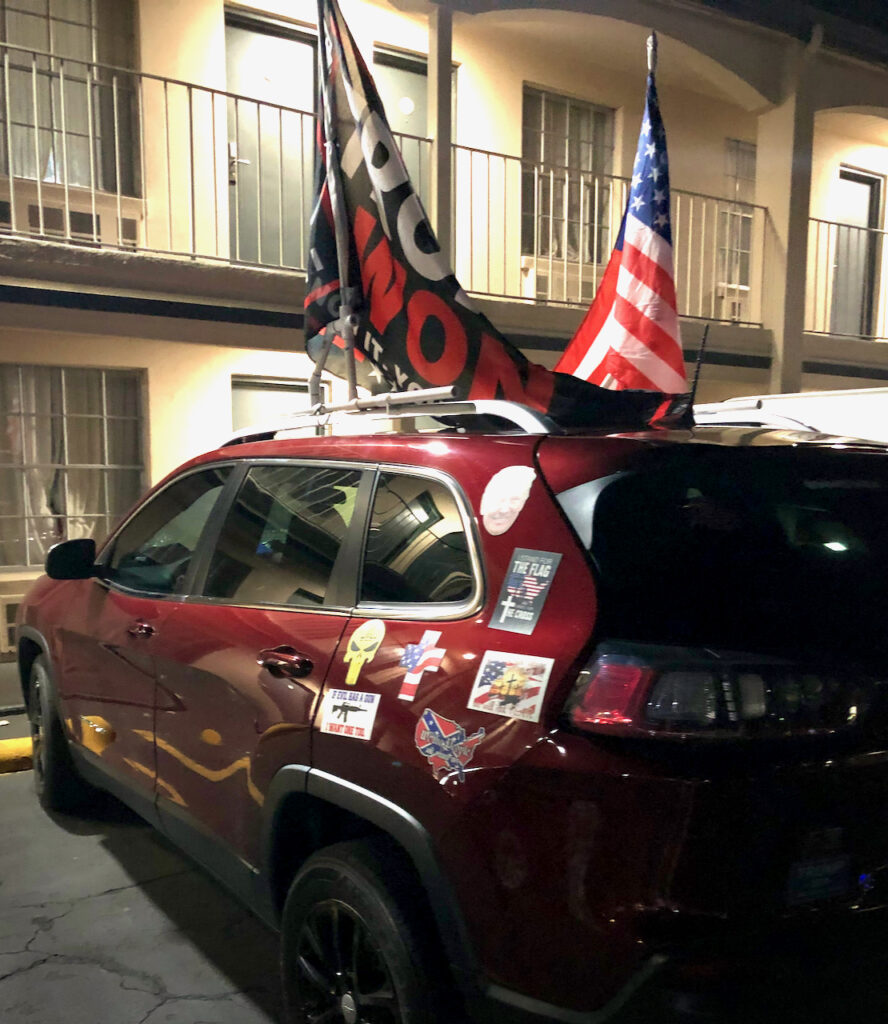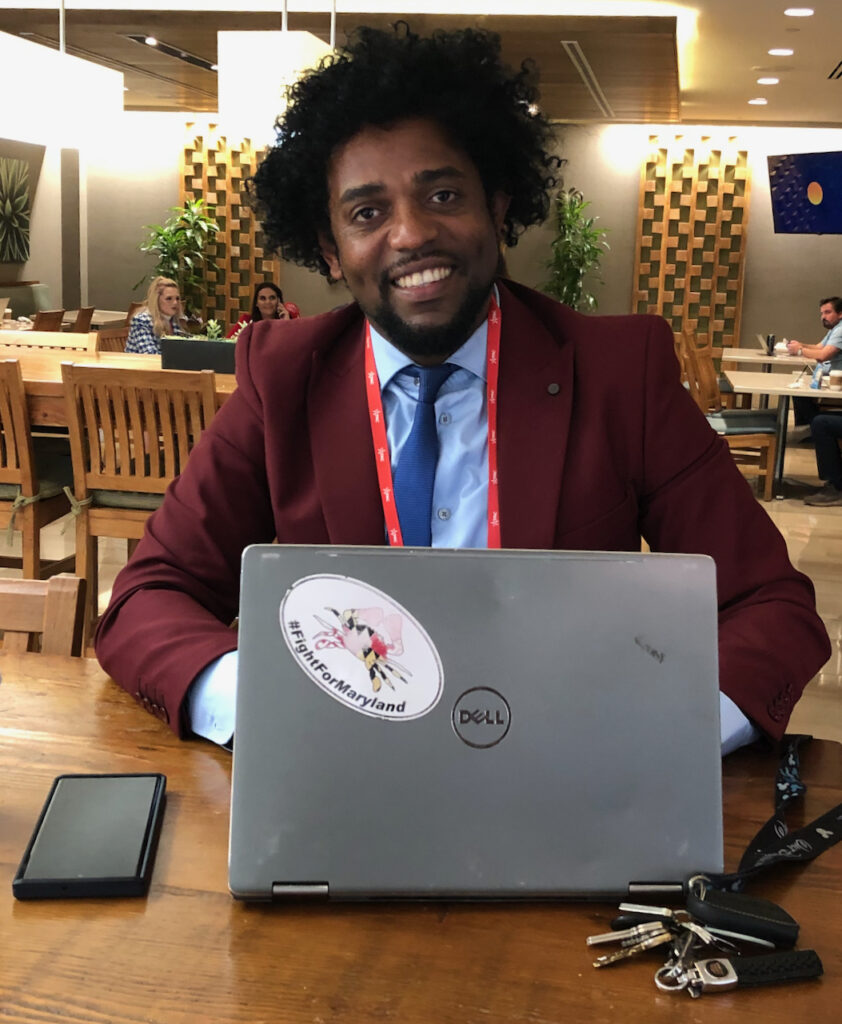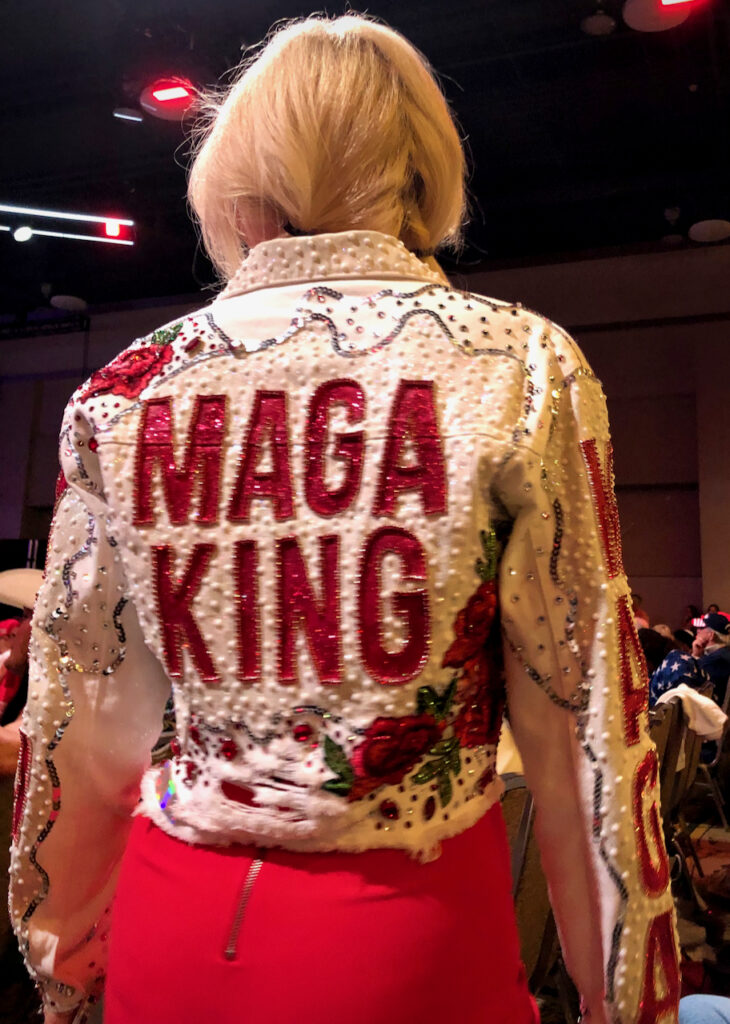
“This hat gives me a lot of power in a way. […] There was something about when I put this hat on it made me feel like Superman. You made a Superman—that’s my favorite superhero—you made a Superman cape for me.”
—Kanye West, on being given a red MAGA hat during a visit to President Donald Trump in the Oval Office, October 11, 2018
A friend and I were trying to understand how shared values create success or failure in relationships. He had experienced problems (everything from uncontrolled debt to infidelity) with his partner early in their committed relationship, which had kept them at the time from achieving what both said they wanted as a couple and as individuals.
After long work, things became stable and productive for them both. Still, he said, it felt as if everything about their lives was put at risk when his partner got stressed, such as at work, and signs emerged again that values held in common were faltering. The warnings were mostly banal (leaving trash on the floor, being late without notice) but sometimes had potentially big consequences (failing to renew an insurance policy).
Relationships succeed to the degree that both parties act on some mysteriously-significant number of shared beliefs and behaviors. When stress, selfishness, mental health, addiction, petty rebellions, or the whisper of an outsider makes a partner thoughtless—thoughtlessness being the failure to hold a common existence present before the mind—relationships can be sunk.
What gets confusing is when thoughtless partners say they want to stay in the relationships despite their destructive behaviors, or by their vehemence show that some core of their identities is bound up in the very thing they work to destroy.
I am talking about America too, of course, which is in a particularly riven relationship with itself.

Shopping for souvenirs at CPAC Texas. (Photo by John Griswold)
In August 2022 my editor asked if I wanted to go to CPAC, the Conservative Political Action Conference that would be held in Dallas. He believed I would be a “fish out of water” there, which might help me write freshly about the event. It is true that MAGA conservatism embodies almost none of the values I believe compatible with national union. But I would have been a fish out of water at a Bush the Elder primary. The idea of CPAC made me sore afraid, so of course I wanted to go. I felt like the boy in the daguerreotype who has climbed a tree in order to better view the state funeral cortege.
• • •
CPAC Texas 2022 was two things for attendees, most of whom were local to Texas: dozens of exhibit booths in a convention hall, and dozens of speakers, one after another, on a central stage in a ballroom over three days.
(There was also a “media row,” inside and outside the exhibition hall, a rogues’ gallery of mostly hard-right podcasters, streamers, and online news services that disseminated MAGA propaganda, such as Epoch Times and One America News. While these were curiosities for attendees—Mike Lindell, the pillow guy, was often speaking to cameras in front of the booth for his website and streaming platform Frank Speech—they were really for those tuning in at home.)

A car at an overflow hotel the night before CPAC. (Photo by John Griswold)
Overall, I was surprised at CPAC’s relative mildness. Sure, exhibit booths were often gaudy or tacky in a way that reflected Trump’s aesthetic—medieval carnival—that many have said is a class marker he trades on for fealty. (His supporters do not want him elegant or even coherent. He is like a poorly-translated menu in a restaurant: what is wrong about him is also his mark of authenticity.) Vendors sold bedazzled MAGA and Trump clutch bags, some shaped like handguns; toilet paper with Nancy Pelosi’s face on it with a Hitler moustache; and all manner of MAGA hats and T-shirts showing Trump as Superman or as “the return of the MAGA king.” Unlike booths at street fairs where I live, these had no militia or insurrection messaging.
Costlier cynicism was represented by vendors selling Vibra Plates (“medical grade technology” to “build muscle,” “tone and tighten skin,” “increase sexual function,” “cellulite reduction,” and “drain lymphatic system”) and AdvantageGold (“#1 Rated Gold Company in America,” “Providing reliable investment growth strategies through precious metals ownership”). But this kind of cannibalism is common at many conferences.
His [Trump’s] supporters do not want him elegant or even coherent. He is like a poorly-translated menu in a restaurant: what is wrong about him is also his mark of authenticity.
Of course, platform-specific organizations held forth in their booths, including Gun Owners of America (“‘Worse than bad,’ Sen. Harry Reid [D-NY],” their ad crows); Young Women for America (“She prays, she votes”); and Students for Life of America (“We are the post-Roe generation”).
And, yes, speakers in general sessions rallied the troops with abstract language meant only to rile the emotions (“socialists,” “communists,” “Ultra-MAGA”) and made outrageous claims to the often only quarter-filled ballroom that could seat thousands. “We Are All Domestic Terrorists” one general session panel was titled, which chimed with the jail cell placed in the exhibit hall outside, where an actor in a prison jumpsuit, pretending to be a detained January 6 rioter, wept for hours in character.
But everyone I met at CPAC was polite, nice, and mostly calm, at least until the last day, when Trump gave his keynote speech. If an American writer—hypersensitized by fourteen years of Obama/Trump/Biden-era threats of secession, civil war, and populist putsch, and with a long family history of New Deal beliefs, labor organizing, and Democratic voting—had walked through CPAC, the belly of the beast, they would have seen MAGA apparel, imagined unfocused eyes eager to be part of something bigger, noted well-dressed heavies conferring quietly outside meeting rooms, but they would not have witnessed the loud, ignorant superfans or self-gathering mobs prominent at other sorts of Trump rallies. Booth-sitters often started their patter with conciliatory language about how their organizations or businesses were neither conservative nor liberal.
“We Are All Domestic Terrorists” one general session panel was titled, which chimed with the jail cell placed in the exhibit hall outside, where an actor in a prison jumpsuit, pretending to be a detained January 6 rioter, wept for hours in character.
Many attendees simply walked around the conference looking at things, reminding me, in their cult clothing, of those who walked around the Capitol Rotunda, looking at paintings and statuary, after the initial violence of January 6. Here were the fruits of participation in the movement, they seemed to be thinking, the material evidence of a will to power.
• • •
In fact, the only real issue for the working writer at CPAC was that interviews with conference-goers were not only hopeless but hopelessly redundant. Interviewees began by claiming no agenda, expressed the rote desire that America come together, then began to state specific grievances that they had “researched” or otherwise made legalistic, such as “pornographic” books being given to young children in schools.
Soon after that, their faces got The Look. Pent-up by politesse, they began to spew the same undigested words ingested from right-wing media and the internet, faster and faster, and the spewing was both the point and its proof. They could talk in this mode for thirty minutes, an hour, and if I interrupted to ask a question, they looked stunned, as if they had been hit in the head. It took them a few seconds to understand their flow had been halted, and more time to realize something was expected of them. They seemed surprised too when they could do little more when asked to explain than repeat what they had already said. The volume of the nervous flow made it impossible for them to stick with one topic or address specific aspects of it. It was as if they were possessed by the spirit of their movement and were talking in tongues. (A liberal friend insists MAGA passions will be proved one day to be a mass hysteria similar to the Dancing Plague of 1518.)
Many attendees simply walked around the conference looking at things, reminding me, in their cult clothing, of those who walked around the Capitol Rotunda, looking at paintings and statuary, after the initial violence of January 6. Here were the fruits of participation in the movement, they seemed to be thinking, the material evidence of a will to power.
I stopped to speak with Michael Yadeta, 35, who was working on his laptop through lunch on the last big day of the conference. Yadeta has a bachelor’s from Harvard, a master’s in civil engineering, and ten years’ experience in his field. He came to the United States from Ethiopia when he was nine. Now a conservative from Maryland, he had come to think he was one of the few attendees who flew to Texas for the conference, and he was very sweet, polite, and appreciative that I wanted to talk.

Michael Yadeta, August 6, 2022. (Photo by John Griswold)
“Maryland is very far and a very blue state,” he said. He has lived there fifteen years but feels it is hard to be Republican or even speak to his fellow Marylanders. “Every time you try to speak about values, children, about this—if you remember—critical race theory, or the war among Black and Whites, stuff like that, [you get] who did this to you. I’m a Black person, an African-Ethiopian American, I believe in working hard…not taking money from government and being jobless, stuff like that; we need to create works, so I don’t want to believe in victimization; I want to go forward.”
Eventually, he revealed he had run in the House race for Maryland’s 8th Congressional District a couple of months earlier. He told me he lost against Jamie Raskin (D); actually, he pulled 16.5 percent of the vote in the Republican primary against winner Gregory Coll’s 83.5 percent.
“I believe in the Republican conservative values,” Yadeta said. “I’m a Christian. I also believe in other people’s religion, but I [put] conservative value[s], like the family, laws, the love of America, help[ing] Americans, first. This is what’s going on right now; so much is going on, so I feel like hearing and getting together with conservative families from all over the place; maybe [it] will help [resolve] the differences [in] the party of right now. So it makes me so happy to see friends while I’m working.”
“It’s been a blessing for the last three, four days now,” he said of CPAC. “Tomorrow early morning I fly back to Maryland.”
Trying to get at the specific why, I asked what it would mean to him personally to have a conservative White House and Congress again.
“Honestly, everybody’s watching,” he said, “and it’s a simple mathematics to see what’s going on with our foreign policy, with veteran affairs, how they’ve been treated.”
If I was Jordan Klepper, I would have pointed to Trump’s bizarre ideas of U.S. foreign policy and any number of issues he decided in which veterans lost out. But what was the point? I think now of Joan Didion saying she did not like to talk to people she was writing about and felt that watching from the edges was more useful in showing who they were.
Yadeta said, “The [Biden] White House I think [is] full of a lot of people I think had a lot of experience…the president himself worked for 50 years plus.” But he blamed Biden entirely for “no exit strategies in wars,” for gas prices, inflation, and the perception of America abroad.
I think now of Joan Didion saying she did not like to talk to people she was writing about and felt that watching from the edges was more useful in showing who they were.
“I love America, because America wants to help everybody,” he said. “But that goodness is turning to evil now. People are looking at Americans as if we’re evil. We’re not.”
I kept trying to redirect to something personal and specific.
“This is the worst thing,” he said. “We need to focus on America. Our veterans, mothers, childrens [sic], and all that kind of thing. Who can keep this country better [than MAGA Republicans]?” In rapid succession he brought up China, Bernie Sanders, employment, an 18-year-old who shot up his school “because it had brainwashed him.”
“That all brings me to where we should talk about ‘Godly,’” Yadeta said. “Believing in God, because it’s not only the law that keeps us together, it’s also a fear and love. Respect and love. And that can only come from God.” He returned to a mélange of gas prices, the economy, and critical race theory again, without definition.
“So definitely, definitely—respectfully—the White House right now is not doing what I thought [they] would have done.”
“You see, this is mathematics 1+1. It’s not really some…because we should learn from 10 years ago, five years ago, four years ago. I’m talking about Ukraine too. […] I’m not saying only Democratic government did this. When are we going to stop? When are we going to count together? Love each other, work together. American. You talk about the immigration thing, people coming to America as if they’re getting money from a tree….” Gas prices, again; inflation again.
“The next person [in the White House] has to be really, really a miracle to turn this around. A miracle,” he said.
I asked if he would listen to Donald Trump’s speech that evening.
“Of course, I’m here to see the President, because as I said, I strongly supported him, I wish everybody does, because this is about America… it’s not about Biden or Trump or anything. So, President Trump? He’s got the skills. And the way he got the skills is [as] a businessman. See, through time, I’m learning how to do balance sheet, debit and credit, how to make money. What makes this world is about money. And, of course, knowledge. And now the biggest war we have is [over how the] fear of God is out of American [life]. Childrens [sic] are not listening to their fathers. So, President Trump, I’m waiting. I’m looking forward to his speech. Hopefully, hopefully, he’s going to unite our party, because like I said: our Republican party, some people need to come back to the conservative idea.”
“I hope President Donald Trump will come with a good plan,” he said, smiling, “which he already has, and of course, respectfully, Mr. Biden and Kamala Harris will resign—I wish they’ll resign today, because we’re in crisis….” He said the prime ministers of the UK and Israel had already resigned for the betterment of their countries, which should be Biden’s example.
• • •
I went to CPAC to learn the bases for the movement that I feel threatens our republic and to which I have lost friends. The friends, before they disappeared into it, were never able to explain their passions in ways I could understand. I had hoped conference attendees might.
All I gained in understanding from CPAC was a bit stronger sense of what Hannah Arendt meant when she said, “One can resist only in the terms of the identity that is under attack.”

Moments before Donald Trump gave the keynote, CPAC. (Photo by John Griswold)
Where am I under attack from Trumpism? From its strong, exclusionary sense of identity, oddly enough, since the right says they hate identity politics. I was a teacher, and I am now a writer and a reader. I am often critical of power and thought by some to be intellectual or to work for “the media.” All of which might make me, as Trump said yet again in his speech at CPAC, an “enemy of the people.”
I went to CPAC to learn the bases for the movement that I feel threatens our republic and to which I have lost friends. The friends, before they disappeared into it, were never able to explain their passions in ways I could understand. I had hoped conference attendees might.
It is no secret that I believe in social safety nets, corporate oversight, racial equality, women’s right to choose, affordable healthcare, the freedom to love and to marry, and the natural world as something other than a resource to burn for profit. This leaves my own identity, if it is to be called such a thing, open to attack for being antithetical to MAGA-ism, or maybe that which gives MAGA meaning. That I am a father of two sons, a fiercely loyal friend, a veteran, and someone who can fix things and possibly survive if dropped almost anywhere on the planet is to shed data that do not fit the narrow sense of MAGA identity.
It is a thoughtless identity which cannot keep present before its mind the necessary and desirable relationships with other identities of our nation and world. The tensions this creates in people who claim to be the only true patriots are huge. Noam Chomsky says you cannot talk about the United States without acknowledging how frightened it is. This was never truer than in the MAGA movement.
• • •
For years I noted the odd grins on the faces of Trump supporters as they said terrible things about women, LGBT people, immigrants, the poor, races other than White, etc. The grinning, I felt, was not joking, amusement, or self-deprecation. If anything, it was the unconscious manifestation of a feeling that they had realized a solution for something they feared. It was a street-level version of what Carlos Lozada writes about in The New York Times, regarding the Big Lie of election fraud:
“When politicians…give up on the challenge of governing the country for the rush of triggering the enemy, they are telling the joke. When they intone that they must address the very fears they have encouraged or manufactured among their constituents, they are telling the joke. […] The big joke drains language of meaning, divorces action from responsibility and enables all manner of lies. ‘Getting the joke’ means understanding that nothing you say need be true, that nobody expects it to be true—at least nobody in the know.”
“Their self-serving belief [was] that they could channel dark arts for noble purposes,” Lozada says. “Most of all…they believed they were playing ‘some big game devoid of real-world consequences.’”
MAGA enthusiasts and CPAC attendees feel, I guess, something like lesser characters in a Marvel movie, sharing in magic powers on a melodramatic battleground of good and evil. One might say this is a feature built into representative democracy, but in the United States there are historical expressions of it that align uncannily with our time.
Joan Didion writes in After Henry of Jesse Jackson in 1988: “[A] number of white Jackson supporters to whom I talked would quite serenely describe their candidate as a ‘con man,’ or even as, in George Bush’s word, a ‘hustler.’ [Didion denotes Jackson a “populist.”]
“’And yet…,’ they would say. What ‘and yet’ turned out to mean, almost without variation, was that they were willing to walk off the edge of the known political map for a candidate who was running against, as he repeatedly said, ‘politics as usual,’ against what he called ‘consensualist centrist politics’; against what had come to be the very premise of the process, the notion that the winning of and the maintaining of public office warranted the invention of a public narrative based at no point on observable reality.” (81-2)
Or, if you like, Didion on Reagan:
“From the beginning…the principal in this administration was operating on what might have seemed distinctly special information. He had ‘feelings’ about things…. ‘I have a feeling we are doing better in the war than the people have been told,’ he was quoted as having said in the Los Angeles Times…. With the transforming power of the presidency, this special information that no one else understood—these big pictures, these high concepts—took on a magical quality, and some people in the White House came to believe that they had in their possession…the Fisher King himself, the keeper of the grail, the source of that ineffable contact with the electorate that was in turn the source of the power.” (43)
At CPAC I realized the grinning had stopped. Whatever that was was gone with one exception. What remained would don the crusader suit of MAGA-ism and push forward in earnest.
The suit, in its physical forms, is the red hat that made Ye feel like Superman. It is the BDUs of paramilitaries with unit patches that (wrongly) imply military training, discipline, and toughness, and with body armor, helmets, comms headsets, and assault rifles with folding stocks. (Meal Team Six, the memes mock.) It is “fashy” haircuts. It is the woman in the Maga King jacket in the general session before Trump’s speech, and the five people in shirts that spelled TRUMP (until one left and the group spelled out RUMP), cheering his arrival. And though they were not numerous in the parking lot at the Hotel Anatole in Dallas, it is the lifted F-250s that fly American, MAGA, and thin blue line flags, whose cabs broadcast the rants of White men in beards and wraparound shades. The suit is the pancake makeup and coif of the oleaginous Matt Schlapp, Chairman of the American Conservative Union, CPAC organizer, and general session host, as he tossed softball questions to the likes of Jim Jordan. It is Trump’s iconic badly-hanging suit and cheap-looking red tie.
MAGA enthusiasts and CPAC attendees feel, I guess, something like lesser characters in a Marvel movie, sharing in magic powers on a melodramatic battleground of good and evil. One might say this is a feature built into representative democracy, but in the United States there are historical expressions of it that align uncannily with our time.
None of this is mere fashion, or even persona, a mask meant to hide the face or freeze it in a pose. The suit is, psychically, a whole-body thing, making its inhabitant feel like a cyborg, a Transformer, Iron Man. Wearers see everything through its plastic lenses, feel its apparently superhuman capacities, and hate those not wearing the same suit.

“You Next.” Unidentified Proud Boys, CPAC. (Photo by John Griswold)
The most obvious case at CPAC was the two Proud Boys, so very proud to be recognized as such in their ballcaps, shades, and crested polos. They were the last people grinning. I asked if I could get a photo of them for my publication, and they were amused and flattered. I asked them to pose however they wished, so they walked to the fake jail cell and took tough-guy, mean-grinning stances. But when I asked if I could interview them, with or without their names, they grew nervous, flipped over their badges, and got angry. “We have somewhere else we gotta be,” one said. No superheroes like having their real identities revealed.
To break the magical spell of MAGA, something about the suit will have to become unattractive. But the suit is powered-up by outrage and gives its wearers the ability to survive more outrages that give it more power. In the suit, adherents do not care, will not give an inch, resist everything in principle, and laugh in others’ faces. It is a cartoon fantasy taking itself seriously and expecting us to do the same. The suit is often now invisible.
One of the more alarming questions of all this is how free any of us are. When are we not filling ourselves, or letting ourselves be filled, with someone else’s identity? Are we anything but vessels, so that freedom can only occur by breaking the vessel?
• • •
On the last full day of CPAC, a manic energy bubbled up due to the impending arrival of Trump. The ballroom finally filled to capacity. People jostled impatiently in the hallways, vied for $15 salads. An old White guy laid hands on a young Black man over a seat being saved, and shouting ensued until the ushers came. Trump, however, seemed tired and followed his script for a change, fawning for the audience about straw-poll results at the conference and rehashing material that went back to his first campaign (except for the suggestion, new to me, that the homeless should be taken forcibly from our cities and put into internment camps of tents on their outskirts).
To break the magical spell of MAGA, something about the suit will have to become unattractive. But the suit is powered-up by outrage and gives its wearers the ability to survive more outrages that give it more power. In the suit, adherents do not care, will not give an inch, resist everything in principle, and laugh in others’ faces. It is a cartoon fantasy taking itself seriously and expecting us to do the same. The suit is often now invisible.
Trump, who like Reagan had experience in TV/film, is also considered by some a “great communicator.” Reagan was called that for trying to educate and make things understandable. Trump is thought of as one because he causes emotion in his base without saying much that is substantive or intelligible, or in this case, energetic. At CPAC, in his muted form, he reminded me of Didion’s comment on Reagan to Charlie Rose: “I thought of him as, like, that unlikeable, least favorite uncle who is really kind of mean if he doesn’t get the piece of jerky he wants.”
But his audience did not care if he was tired. Before his speech, when no one could leave the ballroom and come back in for security reasons, attendees lined up to be ushered into specific seats by production assistants to increase energy and audience density for the cameras. They were given MAGA shirts, hats, and other geedunk to wear or wave, and ordered over loudspeakers to make a show. They clearly relished doing their part for their leader; they shared in the potential energy. When it was over they were very much energized, and a river of people who had gotten their money’s worth streamed out of the ballroom, through the exhibition hall, and down the hotel passages for the lobby, where an Uncle Sam did tricks on a Segue. It was late. It had been a long few days.
Three young guys, each at least 6′ 3″, with the handsome heads of future patricians, great blond hair, perfect teeth, and the Oxford shirts, shorts, and boat shoes that said one of their dads’ boats had tied for sixth at the Newport Bermuda Race two years ago, were in the river of people behind me. They looked like Kennedys, but their outfits were MAGA suits. They were loud, arrogant, drank from flasks like naughty boys, and were talking trash about connections and power. They pushed aggressively around me in the crowd to take up positions near some movement star—Bannon, I think—being interviewed under floodlights on media row. The crowd pushed me toward where they stood in the aisle. I managed not to strike one of their backs with my shoulder, but once I was behind him the crowd shoved, and I shoved the boy, who staggered forward into the lights. He spun, incredulous, looking for enemies. I grinned apologetically, and he must have wondered if I was thoughtless or looking for trouble. I am not sure I knew.
